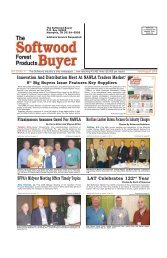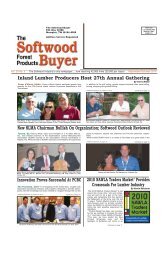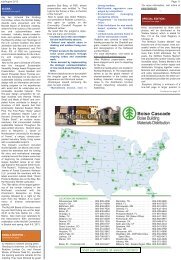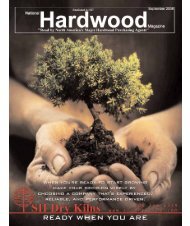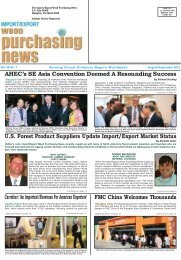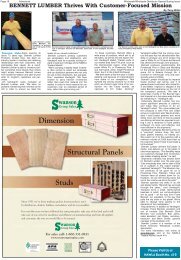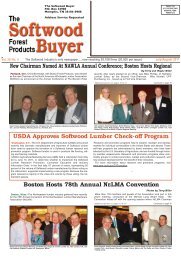CLA Convention Attracts Registrants NAWLA Regionals Attract ...
CLA Convention Attracts Registrants NAWLA Regionals Attract ...
CLA Convention Attracts Registrants NAWLA Regionals Attract ...
You also want an ePaper? Increase the reach of your titles
YUMPU automatically turns print PDFs into web optimized ePapers that Google loves.
May/June 2007 Page 25<br />
APA -<br />
Continued from page 24<br />
research in Taiwan, promotes research<br />
of construction engineering technology,<br />
fire safety, disaster mitigation, and green<br />
building methods.<br />
APA Applauds ITC Review<br />
of Chinese Imports<br />
APA President Dennis Hardman<br />
applauded a request for an International<br />
Trade Commission (ITC) review of<br />
Chinese hardwood plywood imports,<br />
saying he believed it would demonstrate<br />
that those products often are improperly<br />
and in many cases even fraudulently<br />
labeled.<br />
The ITC review was requested recently<br />
by Senate Finance Committee<br />
Chairman Max Baucus of Montana. The<br />
Office of the United States Trade<br />
Representative (USTR) also has filed a<br />
World Trade Organization (WTO) hardwood<br />
plywood subsidies case against<br />
China. APA has provided import statistics<br />
and other relevant information to the<br />
office of Oregon’s U.S. Senator Ron<br />
Wyden, who has helped champion the<br />
campaign against illegally subsidized<br />
plywood imports.<br />
Hardman said that although the<br />
requested ITC review targets only<br />
Chinese hardwood plywood and would<br />
cover a variety of concerns, such as<br />
dumping, illegal subsidies, tariff misclassification,<br />
and illegal logging, he hopes it<br />
would help draw greater attention to the<br />
significant problem of Chinese industry<br />
counterfeit trademarks, absence of<br />
trademarks, inaccurate grade claims<br />
and substandard product performance.<br />
•<br />
British Columbia<br />
Business Trends<br />
Continued from page 2<br />
their product domestically (within B.C.<br />
and the rest of Canada) and almost the<br />
same amount into the U.S. About 5% of<br />
production goes into each Japan and<br />
Europe.<br />
Weather & Water Affecting<br />
the Industry<br />
What affects the primaries has significant<br />
affect on the secondary manufacturers.<br />
Adding to what everyone knows<br />
about the log and subsequent wood<br />
shortages, a two-month towing strike<br />
has caused more problems up and<br />
down the mighty Fraser River, affecting<br />
large and small operators alike. We<br />
were unable to reach anyone at the<br />
major towing companies (I suspect all<br />
management are out on the water moving<br />
booms), but Ken Voight, Operations<br />
Manager at S & R Sawmills in Port Kells<br />
commented that “we had a bad winter<br />
for logging, what with the weather and a<br />
few other factors, and now the few logs<br />
that are out there are hard to get at due<br />
to the towing strike”. S & R has five<br />
custom cutting mills and estimate that<br />
they are getting half of their logs – and<br />
that is thanks to management working<br />
the tugs for the four major services in<br />
the area, along with a few independents.<br />
If the strike doesn’t end soon though,<br />
there will be another major delay. By mid<br />
May, it is predicted by another mill upriver<br />
that the water will be running too fast<br />
and high to move anything. This is a<br />
pretty normal seasonal event, but is certainly<br />
going to compound the problem of<br />
the current shortage of logs.<br />
Gary Ley, a spokesman for Western<br />
Forest Products said that they were not<br />
unduly affected by the strike – that it was<br />
more of an inconvenience, than anything<br />
else. They were able to shift the<br />
schedule around and use additional<br />
suppliers to off-set any potential shortages<br />
of moving logs into the yards.<br />
However, in a recent article in the<br />
Vancouver Sun by correspondent<br />
Gordon Hamilton, Western’s president<br />
Reynold Hert did indicate that both logging<br />
and lumber production were off significantly<br />
because of the severe weather.<br />
Over the winter, roads on the company’s<br />
coastal timberlands were washed<br />
out, slopes became too saturated with<br />
water to be logged, and towboats were<br />
sent scurrying into sheltered coves for<br />
days at a time, unable to deliver what<br />
logs they had to company sawmills.<br />
The extreme weather really hit home in<br />
Port Alberni, where, at one point,<br />
Western’s Somass sawmill was forced<br />
to shut down when a creek burst its<br />
banks and flowed right through the mill.<br />
Other mills closed when they could not<br />
get enough logs.<br />
The storms during November and<br />
December alone knocked Western’s log<br />
production down 500,000 cubic metres<br />
— 25 per cent — to 1.6 million cubic<br />
metres during the fourth quarter.<br />
Western’s Chief Financial Officer, Paul<br />
Ireland said the log shortage resulted in<br />
a 17 percent drop in lumber production<br />
during the fourth quarter. Instead of 326<br />
million board feet of lumber, the company<br />
produced 271 million, a decline of 55<br />
million board feet.<br />
“Unit costs were higher than would otherwise<br />
be the case as a result,” Ireland<br />
said. “Both our timberlands and our<br />
manufacturing operations were negatively<br />
impacted by the unusual weather<br />
we encountered on the West Coast of<br />
British Columbia.”<br />
Western did not release financial figures<br />
on the weather impact but were<br />
able to recoup some of the costs from<br />
the storms by realizing higher sales<br />
prices for its lumber products. Average<br />
prices increased from $739 to $782 per<br />
thousand board feet from the third quarter<br />
to the fourth quarter.<br />
Hert said the weather events can be<br />
coast-wide or localized, pointing out that<br />
the Island’s west coast around Port<br />
Alberni was hit particularly hard. Even<br />
on days when the weather is calm at the<br />
company’s Duncan head office, tugs<br />
towing loads of logs only a few kilometres<br />
away in nearby Stuart Channel<br />
have been forced to seek shelter from<br />
strong winds.<br />
WASHINGTON -<br />
Continued from page 2<br />
•<br />
ways to make up funding shortfalls for<br />
rural schools and communities wracked<br />
by declining timber sales and shrinking<br />
property tax bases.<br />
During the Senate’s recent 51-47 vote<br />
for an emergency war spending package<br />
that sets a 2008 withdrawal date<br />
from Iraq, the money for rural districts,<br />
nearly $5 billion across 39 states, was<br />
added, which binds the two funding<br />
packages.<br />
President Bush has threatened to veto<br />
the bill and has labeled the legislation as<br />
the Democrats’ “arbitrary” troop withdrawal<br />
timeline, as well as for other<br />
spending provisions he derided as<br />
“pork.”<br />
However, with the help of Oregon<br />
Democrat Ron Wyden, a provision was<br />
backed that added $4.7 billion into a<br />
program that helps timber-dependent<br />
counties make up the losses from<br />
declining lumber sales on federal lands,<br />
primarily located in the Pacific<br />
Northwest.<br />
Also included in the Senate bill are $20<br />
billion in domestic initiatives for flood<br />
relief along the Gulf Coast, compensation<br />
for crop losses, drought assistance<br />
and low-income heating subsidies.<br />
The Senate bill would provide states<br />
like Alaska upwards of $10 million a year<br />
over the next five years under a rural<br />
schools plan and its companion program,<br />
called Payment in Lieu of Taxes.<br />
One of the areas most affected is in<br />
Alaska’s heavily timbered Southeast<br />
Panhandle.<br />
Craig called the law establishing the<br />
rural programs “a lifeline for our timberdependent<br />
communities. Letting the law<br />
die is not an option.”<br />
Bush’s Budget Reductions<br />
Impact Forest Service<br />
Budget reductions proposed by the<br />
Bush Administration to eliminate the federal<br />
deficit by 2012 include a significant<br />
Continued on page 26



